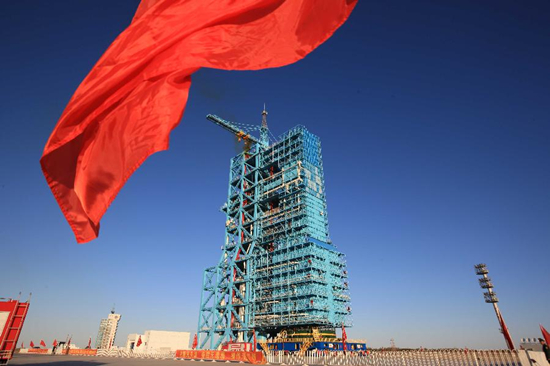Tiangong-1, science or prestige?
- By Stuart Wiggin
 0 Comment(s)
0 Comment(s) Print
Print E-mail
China.org.cn, September 29, 2011
E-mail
China.org.cn, September 29, 2011
|
|
|
Red flag flies at the Jiuquan Satellite Launch Center in northwest China's Gansu Province, Sept. 28, 2011. A spokesperson with China's manned space program said Wednesday that fuel has been injected into the Long March-2FT1 carrier rocket in preparation for launching the Tiangong-1 space module Thursday evening as planned. (Xinhua/Wang Jianmin) |
China is set to launch its Tiangong-1 space module this week. If successful, authorities say they will dock it with another unmanned vehicle, Shenzhou-8, in coming months, a first step towards building a Chinese space station.
The mission is being touted by some Chinese media as a sign of China's speedy rise as an international space power, catching up with the likes of the U.S. But America has scaled down its space program considerably, retiring its fleet of shuttles earlier this year for financial reasons. It is therefore inevitable that China will catch up with America over the course of the next few decades.
The Chinese have already closed the gap considerably in terms of technology, and this will continue to be the case. The pursuit of science is certainly on the agenda for Beijing as it continues to finance China's costly space program, but one might be forgiven for thinking there are broader forces at play.
Last year, I wrote a piece in the Global Times stating that the Asian space race was more about prestige than it was about power. In this article I attempted to downplay talk of an impending space race with the likes of Russia and America, instead drawing focus to the India, Japan and South Korea. The space race is very much an Asian space race, as countries compete for regional ascendancy. I still believe this to be the case, but have reconsidered my initial stance. I originally neglected the pursuit of science as a goal, and overplayed the prestige that China hoped to gain as a result of what at the time was the launch of China's first lunar probe, Chang'e-2.
If the docking mission is successful, China will move closer to its goal of building a nationally independent space station, which it plans to have in operation some time after 2020. Success would therefore be a remarkable achievement, especially as the international space station is due to be retired in 2016 as a result of a lack of funding.
China could emerge as the leading global space power. Plans for the Chinese space station include research on microgravity science, space radiation biology and astronomy. Alian Wang, a researcher in planetary science at Washington University, reveals what possibilities this could mean for China, because "once you establish this semi-permanent orbit then you can think about moving forward to use it as an intermediate step to move forward to other planets or satellites."
Some commentators abroad have talked about Chinese domination within space, threatening the ability of developed nations, i.e. America. Presumably, some are worried about the ability of America to maintain its ability to protect itself and its allies. However, it is a little early to talk of such things, especially as China is at the moment simply retracing the same steps that the U.S. and the Soviet Union trod in the 1970s and 1980s. The explosion of a rocket last month outlines the obstacles that lie ahead for China's hopes in space.
One must also be aware that the launch date of Tiangong-1 coincides with the October National Day holiday; a period when the eyes of the Chinese nation will be glued to their television screens as the majority will be at home. This is where I come back to my earlier statement that the Asia space race is geared towards prestige rather than power. For the Chinese government, the launch of Tiangong-1, and the subsequent launch of the Shenzhou-8 spacecraft later this year, is a powerful tool for social mobilization. Amid reports of an economic slowdown and as domestic issues arise which may draw ire from some sections of society, the Chinese space program is a perfect way to reignite the nationalist, patriotic spirit of the people which ensures that development in China remains peaceful both socially and politically.
Stuart Wiggin is a news editor at China Radio International. He graduated from Oxford University majoring in modern history and politics.
Opinion articles reflect the views of their authors, not necessarily those of China.org.cn







Go to Forum >>0 Comment(s)